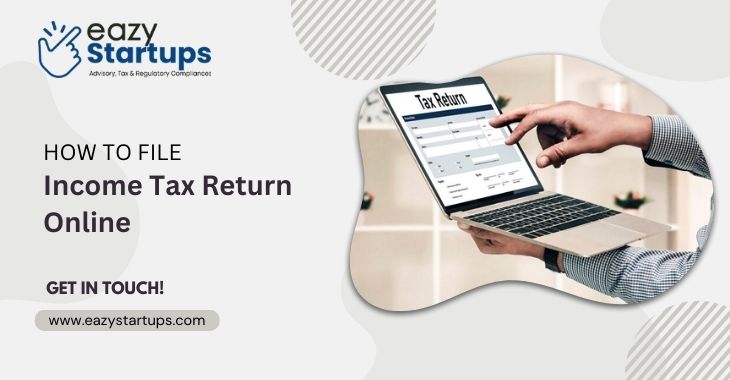The ability to electronically file income tax returns (ITRs) has increased significantly due to technological developments and the streamlining of tax authority procedures. Accuracy, quickness, and accessibility are just a few advantages of completing your taxes online, regardless of your employment status or business ownership. If you apply for Income Tax Filing or Income Tax Return Filing, contact Eazy Startups for the best assistance.
Let’s get into the detailed discussion:-
- Step 1: Gather Necessary Documents
- Step 2: Choose the Right ITR Form
- Step 3: Register and log in using the Income Tax e-Filing Portal.
- Step 4: Fill in Your Details
- Step 5: Check Tax Information and Determine Your Liability
- Step 6: Produce and Verify XML
- Step 7: File an ITR
- Step 8: E-Verify Your ITR
- Step 9: If necessary, Physical Verification
- Step 10: Verification
Step 1: Gather Necessary Documents
Make sure you have the necessary paperwork on hand before starting to file your ITR online:-
Your Permanent Account Number, or PAN Card.
Form 16: This is a summary of your income and the taxes withheld by your employer if you are a salaried individual.
Bank Statements: If applicable, display the interest earned.
Investment proofs include things like PPF contributions and LIC premium receipts.
Information about Income: This includes rental income and any additional income.
Step 2: Choose the Right ITR Form
Depending on your sources of income, choose the correct Income Tax Return (ITR) form:-
ITR-1 (Sahaj): For salaried individuals with one residential property, other sources of income such as interest, and an income up to ₹50 lakhs.
ITR-2: People and HUFs without income from their business or profession’s profits and gains.
ITR-3: For people and HUFs who get money from their business or profession’s profits and gains.
ITR-4 (Sugam): For people, HUFs, and businesses (except LLPs) with presumed income from employment or business.
Step 3: Register and log in using the Income Tax e-Filing Portal.
Register to the Income Tax Department’s e-filing portal if you are a new user. Use your login information to log in if you have already registered.
Step 4: Fill in Your Details
After logging in, choose the ITR form you want to file and the appropriate evaluation year. Provide correct information about your personal information, income, claimed deductions, etc.
Step 5: Check Tax Information and Determine Your Liability
Examine the automatically generated tax information from your Form 16 and other papers. Calculate your income and tax due after deducting items such as 80C, 80D, etc.
Step 6: Produce and Verify XML
After entering all the necessary information, verify your entries to ensure accuracy. Once the data is saved, create an XML file with your filled-out ITR form.
Step 7: File an ITR
Upload the created XML file using the e-filing portal. Upon successful upload, an acknowledgement number (ITR-V) will be generated.
Step 8: E-Verify Your ITR
You can use any of the following techniques to e-verify your ITR:-
Net Banking: Through the net banking service provided by your bank.
Aadhaar OTP: You can use the cellphone number you registered and connected to Aadhaar.
Electronic Verification Code (EVC) for Bank Account: This code is sent to your registered bank account.
Step 9: If necessary, Physical Verification
If you decide not to e-verify, you have 120 days after e-filing to print, sign, and mail the ITR-V to the CPC Bangalore.
Step 10: Verification
Your e-filing process is finished after it has been validated. Your ITR will be acknowledged, and you will receive an email confirming this.
Conclusion
Online income tax return filing expedites the tax authorities’ processing, minimizes paperwork, and streamlines the overall process. You can ensure compliance with tax rules and avoid penalties by carefully following these steps to file your taxes within the designated timeframes.
If you opt to apply for Income Tax Filing or Income Tax Return Filing, contact Eazy Startups to get the best assistance.

